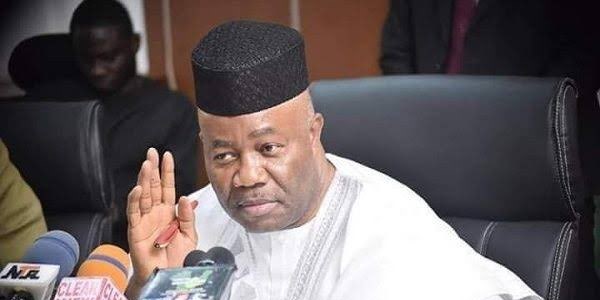...Could be signed by Tinubu today
Stephen Ukandu, Umuahia
Determined to meet the January to December new fiscal year target, the National Assembly, Saturday, passed the 2024 Appropriation Bill of N28,777,404,073,861 trillion into law.
Both chambers of the National Assembly passed the budget in their respective plenaries after jacking up the initial proposal in some sub-heads.
The lawmakers increased the budget estimate by N1.2 trillion from the N27.5 trillion initially presented by President Bola Ahmed Tinubu, to N28,777 trillion.
A careful study of the passed budget showed an increase in the exchange rate from N750 to N800 per dollar while the 1.78mbpd daily oil production, US$77.96 oil benchmark price and GDP growth rate of 3.88 percent were approved as proposed by the executive arm of government.
Ikengaonline recalls that President Tinubu, had during the budget presentation to a joint session of the National Assembly, announced his administration’s resolve to adopt the “Revised 2024-2026 Medium Term Expenditure Framework (MTEF) and Fiscal Strategy Paper (FSP)” as the parameters for the 2024 budget, just as he also announced the administration’s plan to grow the economy by a minimum of 3.76 percent, above the forecast world average.
Tinubu had promised that the Nigeria’s internal security architecture would be overhauled to enhance law enforcement capabilities.
Meanwhile, a breakdown of the N28.777 trillion budget showed that the sum of N1.743 trillion was earmarked for Statutory Transfers, N8.271 trillion, Debt Service, N8.769 trillion, Recurrent (Non-Debt) Expenditure while N9.995 trillion was proposed for Capital Expenditure for the year ending 31st December, 2024.
The N9.179 trillion fiscal deficit is to be financed through Asset sales/privatisation – N298,486,421,740; Multilateral/Bilateral Project – Tied Loans,N1,051,914,486,314 and Debt Financing, N7,828,529,477,860.
For the total Debt Service of N8.271 trillion approved for the year 2024, the sum of N5.300 trillion is to be incurred through Domestic Debts including Ways and Means, N2.748 trillion through Foreign Debts while the Sinking Fund for the retirement of maturing Promissory Notes stands at N223.662 billion.
Under the Statutory Transfer, National Judicial Council (NJC) got the highest allocation of N341.626 billion, followed by Niger Delta Development Commission (NDDC), N338.925 billion, Universal Basic Education Commission (UBEC) got N263.044 billion, North East Development Commission (NEDC),N131.836 billion, Basic Healthcare Provision Fund (BHPF), N131.522 billion, National Agency for Science and Engineering Infrastructure (NASENI), N131.522 billion, Public Complaint Commission (PPC), N14.460 billion, and N5 billion for National Human Rights Commission (NHRC), respectively.
A breakdown of the NASS budget showed that the sums of N78.624 billion is for House of Representatives; N49.145 billion is for Senate, N36.727 billion for National Assembly Office,N30.807 billion for General Services, N20.388 billion for Legislative Aides, N15.189 billion for Service Wide Vote, N15 billion for National Assembly Hospital Project, N12.326 for National Assembly Service Commission (NASC), N12.123 billion for National Assembly Library Complex (Take-off Grant), N10 billion for ongoing construction of NASC headquarters, N9.008 billion for National Institute for Legislative and Democratic Studies (NILDS), N4.500 billion for completion of ongoing NILDS building; N4 billion for National Assembly Recreation Centre; N4 billion for Design, construction, furnishing and equipping of NASS Budget & Research Office (NABRO); N3 billion for procurement of books for NASS Library, N3 billion Senate Car Park, N3 billion for House of Representatives Car Park, N3 billion for upgrade of NASS key infrastructure, N3 billion for Design, construction, furnishing and equipping of NASS ultramodern printing press, N2.700 billion for furnishing of Committee meeting rooms & others offices within Senate building, N3 billion for furnishing of Committee meeting rooms for House of Representatives Part I & II), N2.500 billion for NASS Pension Board (Take-off Grant), N1.230 billion for Office of Retired Clerks & Permanent Secretaries, N1 billion for Constitution Review, N130 million for Public Accounts Committee (Senate), N150 million for Public Accounts Committee (House), N200 million for Senate Appropriation Committee and N200 million for House of Representatives’ Appropriation Committee, respectively.
From the total sum of N50.451 trillion approved for Recurrent (Non-Debt) Expenditure, Ministry of Defence got the highest allocation of N1.308 trillion, followed by Ministry of Police Affairs, N869.121 billion, Ministry of Education, N857.134 billion, Ministry of Health & Social Welfare, N667.577 billion, Ministry of Interior, N362.552 billion, Ministry of Youth, N201.467 billion, National Security Adviser (NSA),N199.763 billion, Ministry of Foreign Affairs , N140.456 billion, Ministry of Agriculture & Food Security, N110.248 billion, Secretary to the Government of the Federation (SGF), N100.248 billion and Presidency, N97.913 billion.
There are strong indications that President Tinubu would today, Sunday 31, 2023, sign the budget into law.
Addressing newsmen after the passage, the Chairman, Senate Committee on Appropriations, Senator Olamilekan Adeola, confirmed that President Tinubu would sign the 2024 Appropriation Bill into law today.
He said that the bill could be signed anywhere, suggesting that the President who is in Lagos for the Yuletide could sign it in his private residence.
It is not clear if the President would be willing to accept the jack up of the budget estimate by the lawmakers.
Some States including Abia, Ebonyi and Enugu States had already passed and signed into law their 2024 budget estimates.

